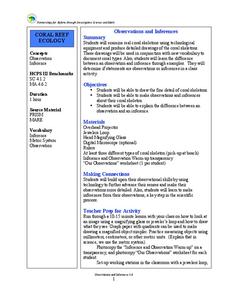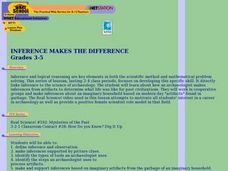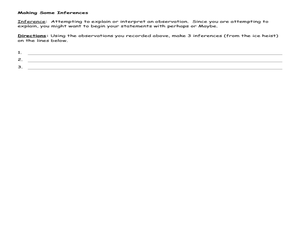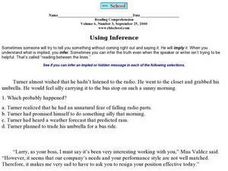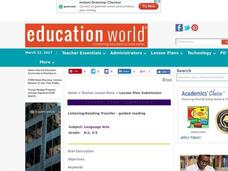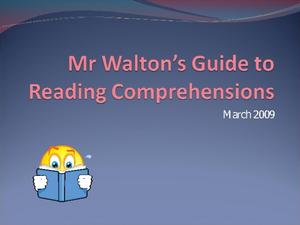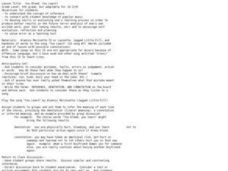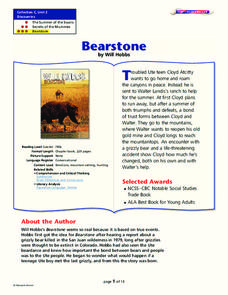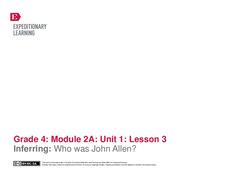Curated OER
Observations and Inferences
Students observe how to distinguish observations form inferences. In this examining inferences lesson students list observations relating to the activity and discuss the importance of them.
Curated OER
Observations and Inferences
Students examine coral skeletons. In this science lesson, view real coral skeletons. Students explain the differences between an observation and an inference. Students draw a coral skeleton.
Curated OER
Inference Makes the Difference
Students explore how archaeologists make inferences from artifacts to explore what life was like in the past. In this archaeology activity, students work in groups and make inferences about an imaginary household based on modern day...
Curated OER
Inferring Themes
Fifth graders practice making inferences on various types of reading material. As a class, they develop a definition of the word "theme" and discuss themes for some of their favorite stories. They use the context of the reading...
Curated OER
Inferences: An Experiment with Ice
For this inferences: an experiment with ice worksheet, students follow the procedure for the experiment with ice, then write inferences from their observations.
Curated OER
Making Inferences
In this literature worksheet, 5th graders focus on making inferences. Students study 5 quotations from the story and respond to 2 short answer questions, drawing inferences from the information that is stated.
Curated OER
Inferences I: Post Test
In this inferences learning exercise, students answer multiple choice questions about inferences after they read passages. Students answer 6 questions total.
Curated OER
Inferences i: Pretest
In this inferences worksheet, learners answer multiple choice questions about inferences after reading passages. Students answer 6 questions total.
Curated OER
Inferencing II: Post Test
In this inferences worksheet, students answer multiple choice questions about inferences after they read a passage. Students read 4 passages and answer 10 questions total.
Curated OER
Inferences/Opinions
Fourth graders practice making inferences and forming opinions. For this reading strategy lesson, 4th graders listen to the book Woodsong by Gary Pauisen. They make predictions about the story before beginning and discuss the story...
Curated OER
Using Inference
In this using inference instructional activity, students select implied conclusion responses, for 4 multiple choice questions, based on the events presented in the short reading passages.
Curated OER
Listening/Reading Transfer - Guided Reading
Work on predicting and making inferences with Danny and the Dinosaur by Syd Hoff. After every few pages, the teacher asks listeners to make predictions of what will happen next. Develop critical reading strategies with your young...
Curated OER
Mr. Walton's Guide to Reading Comprehension
Have your learners become reading detectives using this resource. In a step-by-step manner, they are led through an exploration of how to use inference, deduction and prediction skills to analyze a text. There are examples and prompts to...
Curated OER
You Bleed, You Learn?
Jump back into the 90s with Alannis Morissette's song "You Learn." After hearing the song, small groups analyze the lyrics and write an essay about a mistake they've learned from. Use the example sentences to identify the denotative and...
Curated OER
Stone Soup
First graders examine the use of logic, deduction, and inference to determine the answers to riddles. They listen to a teacher read aloud of Heather Forest's, Stone Soup before discussing the story which gauges their comprehension....
Curated OER
Bearstone
Use the story "Bearstone" by Will Hobbs to explore issues related to growing up. In this work, a troubled teen finds himself through an adventure in the wilderness. Learners practice summarizing, drawing inferences and conclusions, and...
Curated OER
Knights of the Round Table adapted by Gwen Ross
Everyone loves the tales involving King Arthur and his knights. After reading Knights of the Round Table by Gwen Gross, learners draw inferences and conclusions, analyze story elements, and discuss figurative language, including...
EngageNY
Inferring: Who was John Allen?
Help your learners work with difficult or archaic words. A continuation of lesson two of this module, the plan here focuses on deciphering the Inventory of John Allen, in particular the unfamiliar words that make up much of the list. Add...
EngageNY
Reading Literature about Natural Disasters: Inferring about the Impact of Hurricane Katrina on People Living in New Orleans
I survived! Scholars read a firsthand account from a natural disaster survivor in the text Save Bella! They record the gist of the text in their journals and answer text-dependent questions. They then take notes to more deeply analyze...
E Reading Worksheets
Predictions Reading into the Future
Practice making inferences about fiction with a language arts slide show presentation. After kids read a few tips about ways to predict the next event in a story, they read several passages and try to find out what will happen next based...
Curriculum Corner
Riddle Cards
What better way to introduce making inferences than with riddle cards? Young readers practice making inferences through riddle cards and other types of reading, while filling out graphic organizers. The resource even comes with...
EngageNY
Making Inferences About Informational Text: Science Talk on How My Insect Contributes to the Rainforest Ecosystem
We need to talk. Learners participate in a science talk by discussing the idea of how insects are important to the rainforest. They record notes about their conversations as they talk. For homework, pupils add to their field journals.
EngageNY
Introducing The Lost Garden and Finding Evidence of Laurence Yep’s Perspective on What It’s like to Fit into Another Culture on Pages 66– 67 of Dragonwings
How does culture shape perspective? Pupils consider the question as they read an excerpt from Laurence Yep's autobiography, The Lost Garden. Using a graphic organizer, they gather textual evidence and make inferences about the author's...
Curated OER
5th Grade Historical Fiction: Solder's Letter
A picture is worth a thousand words, but sometimes a single word can go a long way as well. Practice making inferences about character traits with a letter written from the perspective of a soldier in the American Revolution.
Other popular searches
- Making Inferences Worksheet
- Observation and Inferences
- Making Inferences in Reading
- Reading Making Inferences
- Making Inferences Grade 2
- Making Inferences Stories
- Lesson Making Inferences
- Inferences and Context Clues
- Generalizations / Inferences
- Inferences in Reading
- Reading Inferences
- Making Inferences 3rd Grade



